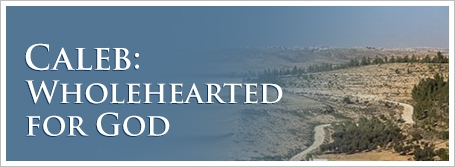Sometimes in life we face obstacles that can hinder us from reaching our goals. During these times we can be tempted to settle for less, even though we know more is available. In the Bible, there was a man who, while facing difficulties, decided to fully follow the Lord; as a result, he received what God had promised to him. This man’s name was Caleb.
The Book of Numbers includes the record of Moses sending out twelve spies, one of whom was Caleb, into the land of Canaan, the land that God had promised to the children of Israel (Numbers 13:1-17). On this reconnaissance mission, these spies were sent to find out about the land, the people, and their dwellings (Numbers 13:18-20). Forty days later, the twelve men returned (Numbers 13:25) and shared their report with Moses and the congregation of Israel.
Numbers 13:27,28:
And they told him, and said, We came unto the land whither thou sentest us, and surely it floweth with milk and honey; and this is the fruit of it.
Nevertheless the people be strong that dwell in the land, and the cities are walled, and very great: and moreover we saw the children of Anak there.
What began as a hopeful report quickly turned into one of doubt and reservation. However, Caleb had something to say about this.
Numbers 13:30:
And Caleb stilled the people before Moses, and said, Let us go up at once, and possess it; for we are well able to overcome it.
Caleb believed that the land that God had promised was ready at once to be claimed. All the other spies except Joshua focused on the obstacles instead of God’s promises. Caleb’s response reminds me of the optimist in a quote from Harry S. Truman, the thirty-third president of the United States: “A pessimist is one who makes difficulties of his opportunities and an optimist is one who makes opportunities of his difficulties.” Caleb chose to focus on the opportunities while ten other spies focused on the difficulties.
Deuteronomy provides some insight into a specific quality Caleb had that separated him from the others.
Deuteronomy 1:35,36:
Surely there shall not one of these men of this evil generation see that good land, which I sware to give unto your fathers,
Save Caleb the son of Jephunneh; he shall see it, and to him will I give the land that he hath trodden upon, and to his children, because he hath wholly followed the Lord.
Caleb “wholly followed the Lord.” He didn’t follow the Lord partially or halfheartedly. He was wholehearted in his obedience and devotion to God.
Long after the children of Israel had entered the Promised Land, Caleb, at the age of eighty-five (Joshua 14:10), was not ready to settle for less than all God had promised. Caleb boldly declared to Joshua in Joshua 14:12:
Now therefore give me this mountain, whereof the Lord spake in that day; for thou heardest in that day how the Anakims were there, and that the cities were great and fenced: if so be the Lord will be with me, then I shall be able to drive them out, as the Lord said.
Caleb went on to possess one of the most fortified pieces of land around, the mountainous region of Hebron. He was claiming what God had promised.
Caleb faced difficulties, but he decided to fully follow the Lord; as a result, he received what God had promised. What about us today? God has promises in His Word for us—promises of health, prosperity, power, and deliverance. When we look at these promises, do we see the obstacles in claiming them or do we see the opportunities? Let’s claim what is rightfully ours as we follow Caleb’s example of being wholehearted for God!

